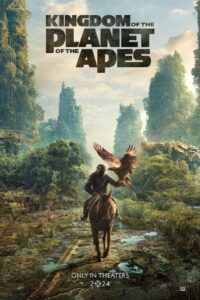
Kingdom of the Planet of the Apes
It’s been ages since Caesar, the first smart ape leader, passed on. Now, apes are running things on Earth, though it’s far from a high-tech society. Noa lives in a small rural community where they use these old, vine-covered power towers as lookout points. Her group trains eagles by taking eggs and raising the birds to respond to whistles—a skill that keeps them safe.
But then trouble rolls in. A nearby kingdom called Proximus Caesar, led by a guy who’s turned his place into a military fortress with the help of a human prisoner sharing tech, launches an attack. They’re after this young woman. She ends up on the run with Noa and Raka, a wise old orangutan who remembers all of Caesar’s ancient teachings.
Here’s where things get complicated: Not all humans have lost their smarts despite this virus that turned many into not-so-bright “Echo” people. Proximus wants to use those few clever humans for better weapons and also thinks they might try to take over again someday.
This whole scenario paints humans as pretty sneaky creatures for sure, yet you kinda feel sorry for them ’cause they’re really down and out. But it leaves you thinking—what’s next? The film definitely leaves room for more juicy drama in future chapters!
Alright, so picture this: “Planet of the Apes” kicks off this trilogy with scenes that take their sweet time—two hours and twenty minutes. You’ll notice it’s packed with clichés, way-too-obvious symbols, and some kind of awkward dialogue.
Here’s the thing—it drags a bit because of the pacing. If you’ve seen any stuff by Matt Reeves, you might have felt similar vibes. You’ve got these apes trying to speak but doing it real slow and clunky. It’s like they’re wrestling each word out. They miss out on things like pronouns or verbs and keep pausing mid-sentence like it’s heavy lifting.
In those earlier movies, humans helped speed things up when they were around chatting away more naturally. But in this one, it feels mostly like an ape-only conversation club that hasn’t quite nailed speaking smoothly yet.
And then there are these predictable moments in the script: there’s this whole falconry side story going down—yep, with eagles swooping around looking all symbolic—and at first you’re wondering what’s up with that? But surprise! Turns out it’s key to how things shake out at the end. It’s sort of like “Chekhov’s gun,” but with talons—spot those eagles early on? Expect them to swoop in dramatically before the credits roll!
Oh, and meet Raka—the orangutan who seems to get talking right. Think he gets caught up in some trope drama too. It hints at his background which sneaks into an overused storytelling pattern about certain character backgrounds meeting cliched fates.
So, here’s the deal with this movie: You’ve got this character Nova, played by Freya Allen (you might remember her as Ciri from “The Witcher”). She’s got some deep stuff going on with loyalty dilemmas and she’s not afraid to make some wild moves that’ll surprise Noa, our main guy. Now, Noa kind of feels like a country kid—think Luke Skywalker vibes but he’s up against a ruthless yet wise empire. His story is classic hero-on-a-journey with not much in the way of surprises.
Wes Ball did glue in some pretty cool scenes here and there. The old cities all overgrown with plants look super neat. But sometimes the logic just doesn’t click. You get those typical adventure movie shortcuts, plus some over-the-top moments that don’t really add up—like water rising unrealistically because, physics? It’s almost like Ball wanted to compete with the finale of “Avatar: The Way of Water,” but let’s be real—it doesn’t quite match James Cameron’s level.
Even if there are bits that don’t work so well, it keeps you curious about how this long-running series will keep changing down the line. Once it picks up pace again after this slow start, it’ll be interesting to see where they go next!
To watch movies and TV shows online, please sign up with our partner, a legit streaming service.
Get Started ➔






